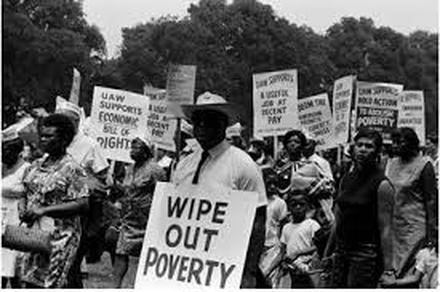 “[A] feminist perspective on the commons is important because it begins with the realization that, as the primary subjects of reproductive work, historically and in our time, women have depended on access to communal natural resources more than men and have been most penalized by their privatization and most committed to their defense.” - Silvia Federici, “Feminism and the Politics of the Commons” “If Jesus of Nazareth, the Christ of God, cannot be an option for Gays and Lesbians, then he cannot be an option.” - M. Shawn Copeland, “Enfleshing Freedom: Body, Race, and Being” If my Facebook wall is any indication, both the Christian Left and the environmental movement are practically glowing with enthusiasm for Pope Francis’s recent encyclical, Laudato Si’: On Care for Our Common Home. Quotes from it are ubiquitous, faith leaders are instructing their followers to read it, and even secular environmentalists are convinced that it is one of the most important documents in recent memory. 350.org celebrated the encyclical, saying that it “reinforces the tectonic shift that is happening, we simply cannot continue to treat the Earth as a tool for exploitation.” Even the significantly more left-wing official page of Javier Sethness-Castro’s book Imperiled Life: Revolution Against Climate Catastrophe has been posting excerpts.
Comments
4/23/2015 Comments Resisting the Disposable CultureBy: Mark VanSteenwyk Note: This article originally appeared on Mark's blog Recently, Pope Francis has been issuing challenges to our capitalist system–how it nurtures exclusion, inequality, and death. He has gotten pushback from the likes of Rush Limbaugh for sounding like a Marxist. I am thankful that the Pope is using his pulpit this way. Here’s an example: How can it be that it is not a news item when an elderly homeless person dies of exposure, but it is news when the stock market loses two points? This is a case of exclusion. Can we continue to stand by when food is thrown away while people are starving? This is a case of inequality. Today everything comes under the laws of competition and the survival of the fittest, where the powerful feed upon the powerless. As a consequence, masses of people find themselves excluded and marginalized: without work, without possibilities, without any means of escape.  I agree with the Pope: what we see in our era of late modern consumer capitalism goes beyond conventional exploitation and oppression. The cost of human lives is now factored in as commodity; using up human lives–in wars or in factories–is a cost of doing business. We have entered a new era of disposable humanity. But it begs the question: What do we do about it? It is one thing to agree with the Pope and share his wisdom on Facebook, Twitter, or (for those stuck in 2004) the blogosphere. Beyond that, we may even try to influence our legislators when we feel stirred. But often such righteous passions are fleeting. How do we respond to the growing devaluing of human beings? Our first instinct, I suspect, is to distance ourselves from this process of dehumanization. We sympathize with the oppressed and cast off, but it has little to do with us. Note: This article was originally published on Women in Theology and is the first of what will be a three part series.
How could anyone expect to profit from unpayable loans without debtors who were already marked by their racial/cultural difference ensuring that at least some among them would not be able to pay? This is precisely what makes 'high-risk' securities profitable. The Black and Latino/a holders of subprime loans, like Dana, owe incomprehensible and unpayable monetary debts precisely because they are not constructed as referents of either the relationship between persons presumed in commerce (which Graeber states precedes all other economic circumstances) or the capacity that according to Karl Marx ultimately determines their value of exchange (the productivity which John Locke, David Ricardo, and Marx agreed elevated the human thing). (Denise Ferreira Da Silva and Paula Chakravartty, Accumulation, Dispossession, and Debt, 367) Money promises value, as Philip Goodchild announces in the quote above. The promise of value is also the production of more money. Because money promises value, for more value to be created, more money must be created. In Goodchild's elaboration, this creation of money to satiate the value it promises is the creation of debt. That is, the promise of value requires the creation of debt in order to produce value.
If money, according to Goodchild, is the promise of value ”a promise which creates debt” blackness, following Ferraira da Silva and Chakravartty's analysis, is the invention of an indelible indebtedness, the promise of a permanent inability to pay the debt that money creates. Blackness' indebtedness is a demarcation of the threat that is named poverty. The threat of poverty in the US is figured as black as the threat of global poverty is figured as Africa. The threat of poverty that blackness represents is the threat that secures the promise of money's value. In other words, money is valuable and desirable because its accumulation is how one proves they are not-black. Goodchild understands the threat to value as exclusion from participation in social life and the loss of freedom: 11/28/2011 Animal Liberation: The Missing Piece Rather than individualized battles, the view of social anarchism encourages us to see struggles as interconnected, and to act appropriately by building alliances and solidarity between them. . . . Yet while social anarchism has been at the forefront of challenging many oppression, most social anarchists have not been very active—either historically or presently—in challenging the human domination of animals.1 On a day like Thanksgiving, when various charred and mutilated bodies lay strewn across millions of American tables, the feeling that is foremost in my heart is not one of gratitude, but of mourning and even anger. That the average person sees no disconnect between centering thanks and grace around death is unsurprising. That this disconnect remains an oversight or rejected outright in radical Christian and anarchist circles is more confusing. Like Bob Torres, anarchist and vegan author of Making a Killing: The Political Economy of Animal Rights, I contend that lack of careful and ongoing attention to nonhuman animal liberation leaves one of the most obvious and persistent forms of oppression unchallenged. Furthermore, it also makes for incomplete and disjointed analysis around other forms of oppression and resistance. Below are a few thoughts on important movements that miss the animal liberation piece and the consequences of that omission. 12/13/2010 Comments Sing We A Song of High Revolt!By: Keith Hebden  At Advent we prepare for Jesus return, for the coming of the Kin-dom of God. The song of Mary—the Magnificat—can help us prepare spiritually for this season because with it we echo Mary’s longing for a new and just re-ordering of society. Like Mary, we have no real idea of what that might mean. Only it will not be like before. Last year, during Advent, Father Tim Jones, an Anglican priest in the Church of England made headline news here in Britain—and not for the first time—for the audacity of translating his faith into political direction. “‘It’s okay to shoplift’ says Father Tim Jones, parish priest of St Lawrence and St Hilda” read the headline and the debate took wings. The inspiration for Jones’s position was the Magnificat—the Song of Mary—a text from Luke’s gospel read daily around the world as part of the evening prayer liturgy. My soul doth magnify the Lord,  Editor’s Note: In parts one and two of this series, Dan Oudshoorn explored the challenges (and hypocrisies) of living in solidarity with folks in the “margins.” Now his attention begins to shift towards the necessity of resistance if we are to participate in liberated communities. In this article, he explores the way in which private property under-girds injustice. If we are serious about our desire to share space, share life together, and participate in God’s new creation, then we must seriously reconsider our understanding of and relationship to private property. Indeed, the more I study the Bible and economics, the more I am convinced that private property is at the core of many of the problems we face and is, itself, a fundamentally anti-Christian belief and practice. There are three sources that have been particularly influential upon me in this regard. The first is the book Faith and Wealth by Justo Gonzalez. In this book, Gonzalez demonstrates the ways in which the Church Fathers consistently and strenuously attacked notions of private property and replaced those notions with a biblical theology that stresses that everything in creation and culture exists as a gift of God for the benefit of all. Furthermore, because the God of the Bible is defined by acts of benevolent and abundant giving, the same characteristic should define the people who follow this God. Therefore, if we wish to live in light of the biblical traditions, we would do well to draw our inspiration from the pre-monarchic economics of the Hebrews, from the correctives offered by the prophets, from the type of collectivity practiced by the early community of disciples gathered around Jesus, and from the economic mutuality that comes to the fore in the Collection that dominates the later years of Paul’s Aegean mission. Therefore, Gonzalez convincingly demonstrates that those who participate in the economy of the Christian God should reject any economics premised upon a right to private property. |
Disclaimer
The viewpoints expressed in each reader-submitted article are the authors own, and not an “official Jesus Radicals” position. For more on our editorial policies, visit our submissions page. If you want to contact an author or you have questions, suggestions, or concerns, please contact us. CategoriesAll Accountability Advent Anarchism Animal Liberation Anthropocentrism Appropriation Biblical Exegesis Book Reviews Bread Capitalism Catholic Worker Christmas Civilization Community Complicity Confessing Cultural Hegemony Decolonization Direct Action Easter Economics Feminism Heteropatriarchy Immigration Imperialism Intersectionality Jesus Justice Lent Liberation Theology Love Mutual Liberation Nation-state Nonviolence Occupy Othering Pacifisim Peace Pedagogies Of Liberation Police Privilege Property Queer Racism Resistance Resurrection Sexuality Solidarity Speciesism Spiritual Practices Technology Temptation Veganism Violence War What We're Reading On . . . White Supremacy Zionism ContributorsNekeisha Alayna Alexis
Amaryah Armstrong Autumn Brown HH Brownsmith Jarrod Cochran Chelsea Collonge Keith Hebden Ric Hudgens Liza Minno Bloom Jocelyn Perry Eda Ruhiye Uca Joanna Shenk Nichola Torbett Mark VanSteenwyk Gregory Williams Archives
October 2017
|
Search by typing & pressing enter


 RSS Feed
RSS Feed